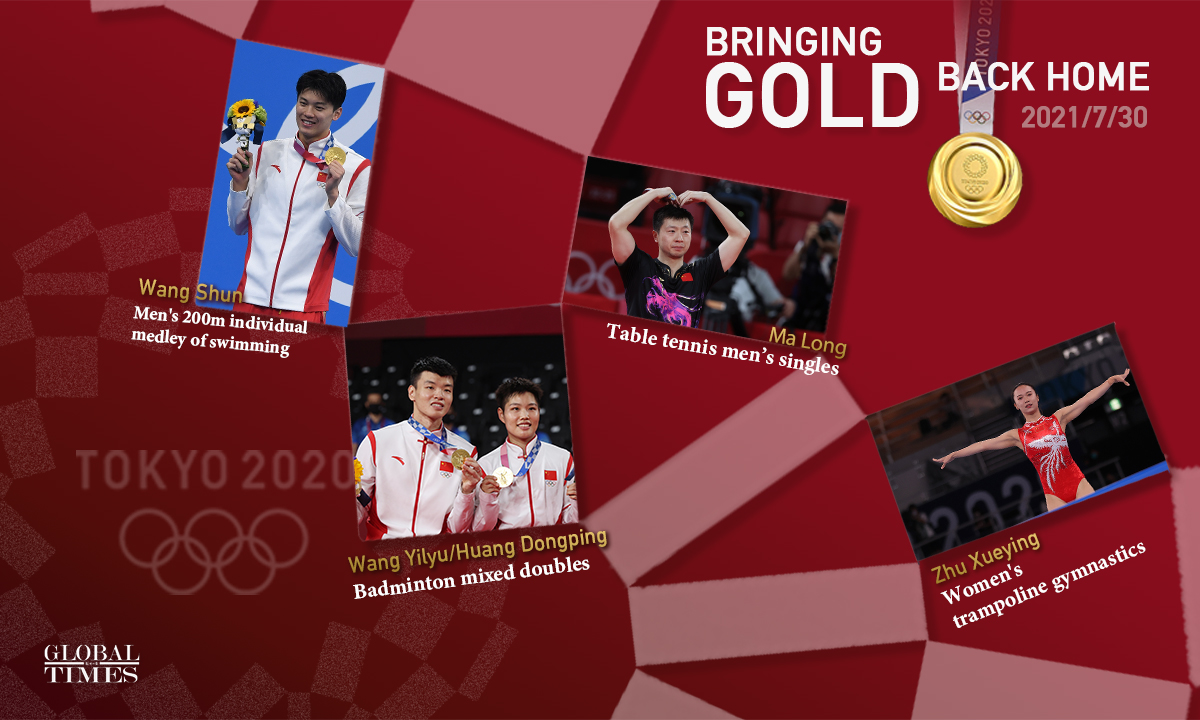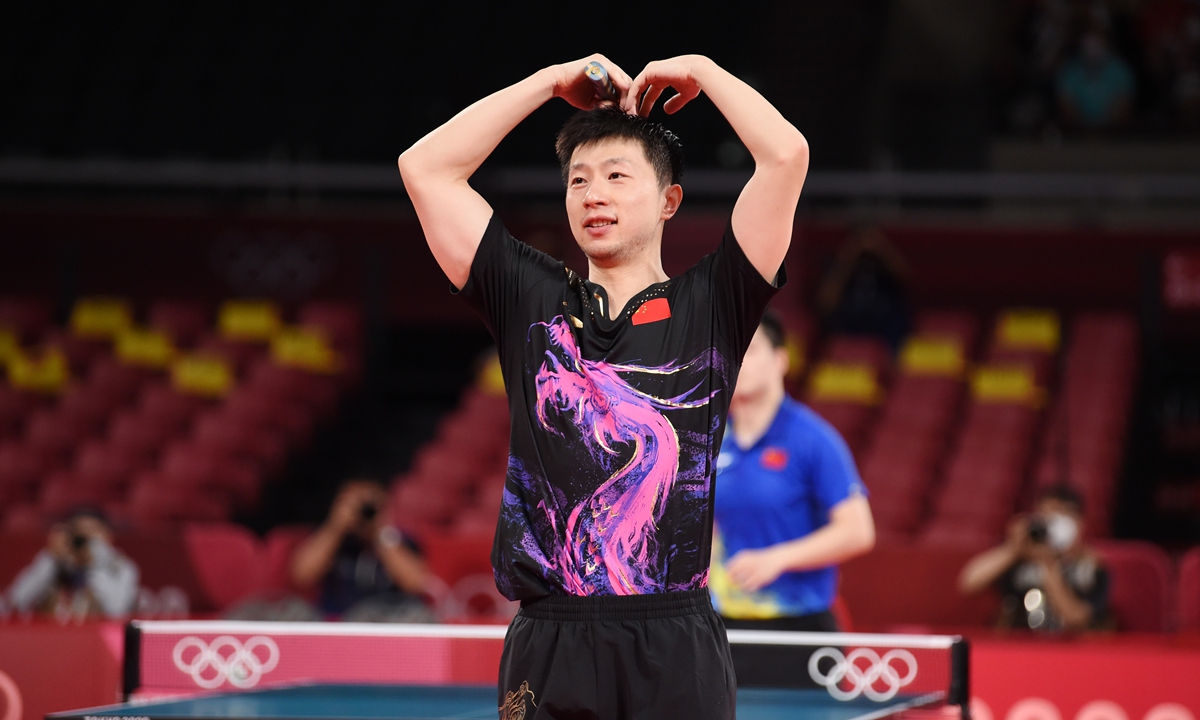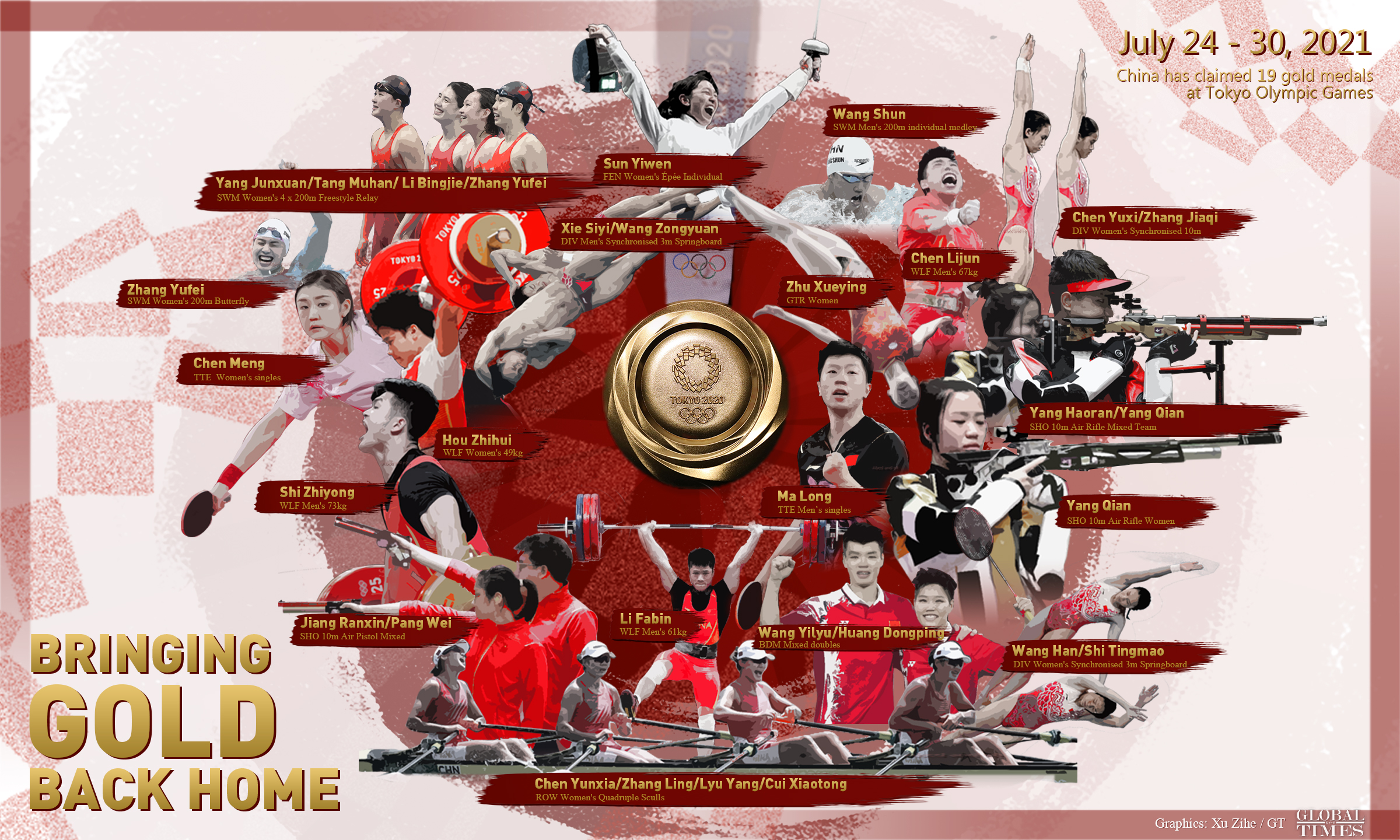
Tokyo Olympics in Day 7: China bagged 4 gold medals in swimming, badminton, table tennis and trampoline gymnastics. Bravo to the gold medalists.
This summer's main event - the Tokyo Olympic Games - has witnessed the legendary performances of Chinese athletes. At the same time, the Chinese audience is becoming more and more mature, bidding farewell to the "medal-first" mentality. But obviously, some Western media are ignoring this change, with a long-held double standard, observers say.
So far, Team China has delivered strong performances in Tokyo. A total of 34 gold medals lifted the delegation to the top of the medal table, with a lead of five golds to the runner-up, the US.
With only four match days left in the Games, it is highly likely that China will guard its leading position, analysts say. If so, it will be Team China's first time to finish an Olympics leading in terms of gold medals outside China.
Of course, the Chinese public is psyched about it. But much more than surpassing other countries in results, the Chinese audience is having more and more to watch beyond winning. Cheering for China's medal success is now just a small part of Chinese fans' Olympic summer, as netizens appreciate the human touch more that is shining in the Games.
On Thursday afternoon, Quan Hongchan, the youngest athlete of Team China, 14, snatched the top podium in women's 10-meterplatform diving, with her teammate Chen Yuxi claiming silver. The whole nation cheered for the girls, as they became the ninth pair to finish one-two for Team China in Tokyo.

Ma Long celebrates after beating compatriot Fan Zhendong in the men's table tennis singles final at the Tokyo Olympics on Friday. Photo: VCG
But even before Quan claimed the gold, she had already become the center of attention. Born in a small village in South China's Guangdong Province, the reason why Quan chose to become an athlete is heartbreaking - she wanted to win prizes as early as possible to help her seriously ill mother.
Ahead of the game, netizens expressed their heartache and respect for Quan, cheering her on while calling her a strong person in life. Later, Quan, who has participated in fewer than 10 official competitions, won the championship without a doubt, with three out of five dives receiving full scores.
"She's such a good girl, and now she is finally having her dream come true," wrote one netizen after witnessing Quan's performance. Of the top 50 trending hashtags on China's Twitter-like Sina Weibo on Thursday afternoon, 11 were related to Quan.
Gold-winning Quan was not the only star of the day. Long jumper Zhu Yaming made history by winning a silver medal with 17.57 meters, the best result ever for the Chinese delegation in this discipline.
The non-traditional powerhouse Chinese track and field team also made many breakthroughs at this year's Olympics. Although many athletes failed to secure medals, they still won widespread public praise.

From winning the first gold medal at the Tokyo Olympics to bagging both gold and silver in table tennis, Chinese athletes have delivered a "golden" week at the Olympics. Here are their championship moments. Graphic: Xu Zihe/GT
The cute side of the athletes off the field was also recorded by netizens.
"They are amazingly cute!" commented Chinese netizens under a video clip from 2008 showing weightlifter Lü Xiaojun and diver Chen Aisen trying out each other's sports, which began to go viral on social media platforms on Thursday.
Many other small moments, including the contestants' catchphrases, tattoos and even badge collections, were also widely discussed.
Both China's athletes and spectators have been gaining a greater appreciation for what the Olympics embodies - the Olympic spirit, the intergenerational legacy of the athletes, the toughness of veterans and the sharpness of newcomers, and even the stories behind the Games' losers.
Regretfully, in relation to all the positive vibes of the Chinese athletes and the mature mentality of Chinese fans, a few Western media outlets chose to turn a blind eye.
"The Chinese Sports Machine's Single Goal: The Most Gold, at Any Cost" was the New York Times' latest headline, with an obvious "sour grapes" mentality at Team China's leading position in the gold medal table.
What is even more ironic is that in 2016, when Team China was lagging behind the US in medals, the New York Times said, "Lower medal count in Rio rattles China's Olympics Obsession."
When accusing the Chinese athletes of only caring for gold medals, the newspaper secretly made a slight change to its display of medal rankings. In 2016, the Times ranked countries by gold medals, while five years later, it is ranking countries by all medals, in order to lift the US to the top.
Another major media outlet, CNN, mocked India's low number of medals in Tokyo. "India, a country of 1.3 billion people, has won just three medals in Tokyo" was the harsh headline.
The double standard displayed by the Western media when talking about medals is a good indication of the inability to face up to the growing power of China and appeared very petty, analysts say.
There is no country that does not attach importance to gold medals, and the US media has given intense coverage to their athletes' gold medals, Zhang Yiwu, a professor at Peking University, told the Global Times. "However, when the Chinese athletes won gold medals, they got a mean attack, which fully reflects the double standard of these media organizations."
The spirit of Chinese athletes, especially the young athletes in Tokyo, is very rich and it is something that everyone can see, Zhang said. People who really pay attention to the game will see them in no way like a gold medal machine. Attacks by the Western media are the same as they have always been, with no basis in fact.
The International Olympic Committee (IOC) President Thomas Bach suggested adding the word "Together" after the Olympic motto "Faster, Higher, Stronger." This is the gap that the Olympics is expected to bridge against the backdrop of increasingly acute international conflicts and the prevalence of nationalism and populism, Zhang noted.
However, the biased reporting of some Western media is exactly contrary to the Olympic spirit, he said.






